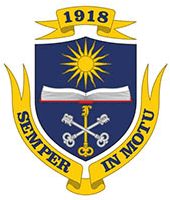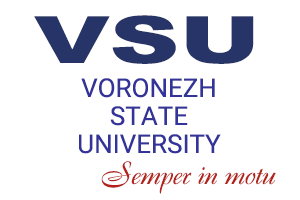On 29 December, the Department of Physical Chemistry of the Faculty of Chemistry of VSU celebrated its 90th anniversary. Associate Professor Oleg Kozaderov, DSc in Chemistry, Head of Department and VSU Vice-Rector for Research, Innovations, and Digitising, told us about the department.
“Department of Physical Chemistry was established in 1932. Can you tell us about the period of its formation and development as an independent educational and scientific unit of our university?”
“At that time, the department was involved in active educational and scientific work under the leadership of the first head of the department, Professor Nikolay Kultashev, a pupil of a well-known physicochemist Gustav Tamman. That was the time when the foundations were laid for several scientific areas that are now being developed at the Department of Physical Chemistry and other departments of the Faculty of Chemistry of VSU. For example, in his PhD dissertation Associate Professor F.A. Santalov, who headed the department for a short period between 1938 and 1939, described the most important requirements for obtaining metal membranes from zinc alloys with silver and copper by selective vacuum evaporation of the most volatile component, zinc. Later, a number of scientific works published at the department were devoted to selective anodic dissolution and selective corrosion of alloys. These works gave way to a new scientific field.
In the post-war years, between 1948 and 1956, the department was headed by Associate Professor S.A. Kretinin, who performed a series of important experiments on filtering water through free-flowing substances.
Work in the research field, which is now the main one for our department, corrosion and electrochemical behaviour, was started in 1939 by Anatoly Shatalov. Since 1956, as the Head of the department Professor Shatalov led intensive research on the problems of electrochemical corrosion of metals. Of particular interest were studies of self-dissolution of metals under conditions of restricted access of the oxidant, in particular in ion exchangers. As a result, Professor Tamara Kravchenko in her DSc dissertation used existing theories and solved the practical problem of continuous and deep removal of oxygen from water. Rational methods of corrosion protection were developed in the DSc dissertation of Professor Svetlana Kaluzhina who used ideas about the mechanism of thermomalvanic corrosion and corrosion during heat transfer. In general, the results of the research conducted by the department in area of corrosion and electrochemical behaviour were very important for that time: they were widely used by enterprises in the electronic and electrical industry, including for the development of new technologies for the production of semiconductor devices and integrated circuits.
In 1979, Professor Igor Marshakov became the head of the department. He conducted extensive studies in the area of anodic dissolution and selective corrosion of alloys, which he began in 1958. Professor Marshakov is one of the founders of a new field in corrosion research, electrochemistry and corrosion of alloys. He is the founder of the leading scientific and pedagogical school of VSU in this area. The results of research carried out under his leadership, allowed solving a number of problems of practical importance.
A significant contribution to the general theory of alloy dissolution was made by Professor Alexander Vvedensky who headed the department between 2000 and 2019. In his DSc dissertation, for the first time he presented a fairly complete and consistent physicochemical model of anodic dissolution of homogeneous alloys.”
“How is the department developing today? What are the results of its research?”
“We continue both fundamental and applied research in the area of electrochemistry and alloy corrosion. In his DSc dissertation, Professor Ilya Zartsyn for the first time described the phenomenon of selective dissolution based on the formalism of thermodynamics of irreversible processes and introduced ideas about the chemical conjugation of partial electrode reactions during the anodic dissolution of metals and alloys in the presence of oxidants. In my DSc dissertation, I managed to establish the physicochemical patterns of formation and development of a nonequilibrium surface layer at the interface of the alloy/solution under the conditions of simultaneous non-stationary diffusion processes, phase transformations and changes in surface morphology. The results formed the foundations for understanding the process of selective dissolution as an electrochemical method of synthesis of highly active electrocatalysts based on micro- and nanoporous gold and palladium.
In the laboratory of metal-polymer nanosystems, our researchers have developed a nanotechnology for deep and continuous electrodeoxygenation of water on synthesised metal-ion exchangers, a method of using them to extract heavy metals, and nanocomposite catalysts for formaldehyde oxidation and disinfection of water (Professor T.A. Kravchenko and Associate Professor V.A. Krysanov). All these results are important for the development of energy-saving and environmentally friendly technologies.
Some very interesting data have been obtained in recent years in the area of chemical deposition of metals and alloys aimed at obtaining coatings, including for the needs of microelectronics (Associate Professor N.V. Sotskaya, research fellow L.V. Yudenkova). We have developed practical recommendations for obtaining high-quality nickel and nickel-phosphorus coatings of a given composition with certain properties: high catalytic activity, high corrosion resistance, and solderability.
Research team of Associate Professor S.N. Grushevskaya has developed an electrochemical method for the synthesis of nanoscale copper and silver oxides with controlled structural, optical, and morphological parameters, which can be used to obtain functional materials used in the field of electrochemical sensorics, catalysis and photocatalysis, and in microelectronic and semiconductor technologies.
We have been conducting a number of studies which can be applied in such fields as ecology, energy, and pharmacy: research of electrooxidation of organic compounds (Associate Professor E.V. Bobrinskaya), synthesis of nickel electrocatalysts by selective dissolution of electrodeposited alloys (Associate Professor I.V. Protasova), quantum chemical modelling of endofullerenes and adsorption processes with the participation of organic molecules and inorganic ions (Associate Professor I.V. Nechaev, Assistant D.A. Machnev).”
“Does the department participate in grant projects?”
“Research projects conducted by the department are implemented with the support of the Ministry of Education and Science within the framework of state order to higher education institutions in the sphere of scientific research, grants of the Russian Science Foundation, and the Russian Foundation for Basic Research. The results of research are presented at national and international conferences, are published in highly rated national and international journals, including those of the first and second quartiles, and are protected by patents.”
“Are companies interested in cooperation with you?”
“Yes, of course. We are involved in mutually beneficial scientific cooperation with our industrial partners, for example, with OAO NIIPM, OOO MBS Construction Systems LLC, EFKO Group of Companies. On their request we conduct commercial research in the field of electronics, chemical sources of currents, anti-corrosion protection of structural materials (including steel reinforcement in concrete).
I would like to pay special attention to research that we are conducting with scientists from the Faculties of Chemistry and Physics of VSU in the framework of major joint projects. For example, the research team of our department works in cooperation with the staff of the Department of Organic Chemistry, the Department of Solid State Physics and Nanostructures, and the Department of Materials Science and the Industry of Nanosystems. The goal of this work is to develop new electrolytes for deposition of metals and alloys for the needs of electronics. In general, we are involved in active cooperation with the Department of Materials Science and the Industry of Nanosystems and jointly develop electrochemical methods for determining the hydrogen permeability of palladium membranes to obtain high purity hydrogen (Professor A.V. Vvedensky, Associate Professor N.B. Morozova). We are involved in a comprehensive megaproject implemented at the Faculty of Physics within the framework of the Federal Scientific and Technical Programme for Synchrotron Research and we carry out high-precision diagnostics of functional electro- and photocatalytic materials synthesised by anodic oxidation of metals and alloys.”
“Your scientific cooperation can’t be limited to colleagues from VSU, can it?”
“Indeed, the Department of Physical Chemistry of VSU has been involved in long-standing fruitful cooperation with scientists from Frumkin Institute of Physical Chemistry and Electrochemistry of the Russian Academy of Sciences, Karpov Research Physico-Chemical Institute, with related departments of the Southern Federal University, Saratov State University, Tambov State University, Perm State University, and Tomsk State University. We have a Joint Research Laboratory of VSU and Frumkin Institute of Physical Chemistry and Electrochemistry of the Russian Academy of Sciences “Adjoint Processes in Electrochemistry and Metal Corrosion”. An important factor for sustainable interactions is the national conference with international participation “Physical and chemical processes in condensed matter and interfacial boundaries” organised by our department.”
“Is it possible to maintain interaction with international scientists?”
“Yes, we are involved in fruitful academic cooperation with the Faculty of Chemistry of the National Institute of Technology in Kurukshetra (India) in the field of physical chemistry, electrochemistry, and corrosion of metals, including within the framework of the “GIAN” programme run by the Indian government. The French government provided support for an international research project with the National Chemical Engineering Institute in Paris run within the framework of the Mechnikov programme. Among the results of international cooperation are a number of scientific publications, reports at conferences and symposiums on corrosion, joint applications for participation in grant projects of the Russian Foundation for Basic Research and the Russian Science Foundation.”
“Let's talk about the educational process. Have you managed to achieve any positive results with regard to the organisation of educational activities by the anniversary of the department?”
“We used extra-budgetary funds to renovate two educational laboratories and to purchase modern laboratory furniture. The university programme aimed at updating educational equipment allowed us to purchase new learning materials in chemical thermodynamics, chemical kinetics, electrochemistry, and colloid chemistry. This made it possible to improve the facilities used for laboratory works in physical and colloidal chemistry. We plan to use this programme to update the equipment for special workshops on electrochemistry, corrosion of metals and alloys, electrochemical technologies, and kinetics.
We pay constant attention to performing methodological work. Academic staff of the department regularly publish text books, and not only in the Publishing House of VSU. For example, the publishing house “Lan” (Saint Petersburg) published two textbooks by staff members of our department for chemistry students: “Modern chemical sources of currents” and “Collection of case studies and problems in electrochemistry”.”
“What are the career opportunities for the graduates of your department?”
“Our graduates work at the enterprises in electronic, energy, and food industries, for example, in Concern Sozvezdie, NIIPM, NIIET, VFSD Micron, Novovoronezh nuclear power plant, EFKO Group of Companies, etc. They also work in medical organisations, pharmaceutical companies, and ecological laboratories (Rospotrebnadzor, AO Binergia, OOO Binnopharm Group, OOO DNA-Technology, etc.). They teach at schools and universities, conduct research in scientific organisations: at Frumkin Institute of Physical Chemistry and Electrochemistry and other institutes of the Russian Academy of Sciences.
Since the opening day in 1956, over a thousand specialists in the field of electrochemistry and corrosion of metals have graduated from our department. Many of them became postgraduate students at our university and other institutions. Over 100 PhD dissertations have been defended. Many graduates have become doctors of science.”
“As far as I understand, electrochemistry and anticorrosion protection are the main research and training areas at the Department of Physical Chemistry. How important are they now and what are the prospects for their development?”
“We explore new electrolytes for modern high-power supercapacitors and synthesise electrocatalysts and photoactive materials for fuel cells and solar panels. We develop original compositions of electrolytes for deposition of metals and alloys in microelectronics. We offer new methods for monitoring the corrosion of steel in concrete.
The results of the research of our department are used to develop effective methods of anticorrosion protection, to synthesise functional coatings for micro- and nanoelectronics, to solve urgent problems in the field of electrochemical, hydrogen, and renewable energy.
To summarise, we are quite confident that the fundamental and applied research carried out at our department in the field of modern electrochemical materials, electrocatalysis, electroplating technology, photoelectrochemistry, and the protection of metals and alloys from corrosion are among the priority development areas in science.”














